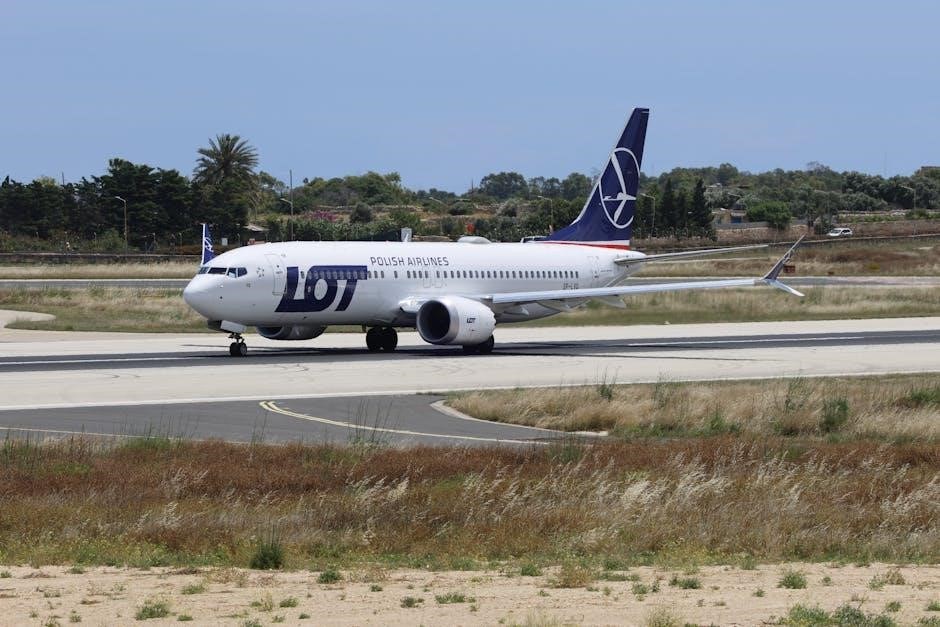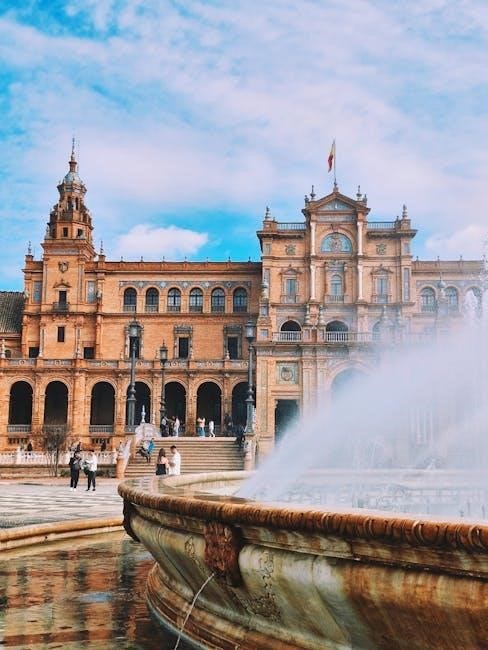The “Clash of Civilizations” concept, introduced by Samuel Huntington, explores how cultural and religious identities shape global conflicts, replacing ideological divisions in the post-Cold War era.
It suggests that future conflicts will primarily arise from civilizational differences, emphasizing the role of culture and religion in shaping international relations and geopolitical tensions worldwide.
1.1. Brief Overview of the Concept
The “Clash of Civilizations” theory, popularized by Samuel Huntington, posits that global conflicts primarily arise from cultural and religious differences between civilizations. Huntington argued that in the post-Cold War world, ideological divides would be replaced by civilizational identities, leading to increased tensions between major cultural blocs. This concept emphasizes the idea that civilizations, defined by shared history, language, religion, and values, are the fundamental units of conflict in the modern era. The theory has been influential but also controversial, sparking debates about its oversimplification of complex geopolitical dynamics.
1.2. Historical Context and Relevance
The “Clash of Civilizations” theory emerged in the 1990s, following the end of the Cold War, as a response to the changing global political landscape. Huntington observed that historical tensions between civilizations, such as those between the West and Islam, or Sinic and Western societies, were resurfacing. The theory gained relevance as it provided a framework for understanding post-Cold War conflicts, emphasizing the enduring influence of cultural and religious identities. This context highlights the theory’s timeliness in addressing the complexities of a multipolar world.
1.3. Importance of Understanding Civilizational Conflicts
Understanding civilizational conflicts is crucial for navigating global politics and fostering cooperation. By recognizing the cultural and religious underpinnings of tensions, nations can better address misunderstandings and develop strategies to mitigate clashes. This awareness also enables leaders to craft policies that respect diverse values, reducing the likelihood of escalation. In a world where civilizational identities often dictate alliances and antagonisms, comprehension of these dynamics is essential for diplomacy, conflict resolution, and building a more stable international order.

Core Concepts and Definitions
This section explores foundational ideas like civilization, culture, and identity, defining how these elements shape interactions and conflicts between different groups in Huntington’s framework.
2.1. What Constitutes a Civilization?
A civilization, as per Huntington’s framework, is a broad cultural entity defined by shared religious, historical, and linguistic ties. It represents a collective identity that transcends nation-states.
Characterized by enduring traditions and values, civilizations are distinct groups with unique cultural and religious practices, shaping their members’ worldviews and interactions.
2.2. The Role of Culture and Religion in Shaping Civilizations
Culture and religion are central to defining civilizations, shaping identities, values, and societal norms. Shared beliefs, traditions, and practices foster a sense of belonging and continuity across generations.
Religion, in particular, provides moral and ethical frameworks, influencing laws, governance, and social interactions. Cultural and religious differences often create divisions, as they are deeply rooted in history and daily life, making them resistant to change.
These elements are key drivers of the clash of civilizations, as they define how groups perceive themselves and others, leading to potential conflicts over values and interests.
2.3. The Clash Thesis: Civilization as the Primary Source of Conflict
The clash thesis posits that civilization, defined by cultural and religious identities, is the primary source of conflict in the post-Cold War world. Huntington argued that
divisions rooted in civilization would surpass ideological or economic differences as the main driver of global tensions. This perspective emphasizes how cultural and religious identities shape
conflict, as civilizations with distinct values and beliefs often find themselves at odds. The thesis highlights the enduring relevance of civilizational differences in shaping international relations.

Major Civilizations in Huntington’s Framework
Huntington identifies major civilizations as Western, Islamic, Sinic, Hindu, Slavic-Orthodox, Latin American, and African, each with distinct cultural, religious, and historical identities shaping global interactions.
3.1. Western Civilization
Western Civilization is rooted in Christianity, Greco-Roman philosophy, and Enlightenment values, emphasizing democracy, individualism, and the rule of law. It spans Europe, North America, and other Anglophone nations.
Its cultural identity is deeply influenced by Protestant work ethic, secularism, and technological advancement. Huntington argues that the West’s universalist claims often clash with other civilizations’ particularist identities, fueling tensions.
This civilization’s global influence is unmatched, but its dominance is increasingly challenged, particularly by rising powers like China and the resurgence of religious identity in the Islamic world.
3.2. Islamic Civilization
Islamic Civilization is deeply rooted in the teachings of Islam, forming a cohesive cultural and religious identity across the Middle East, North Africa, and parts of South Asia.
It emphasizes unity under the ummah, with sharia law and Islamic traditions guiding societal norms. Historically, it has been a hub of scientific, artistic, and intellectual advancement, shaping global knowledge.
Today, Islamic Civilization grapples with balancing religious traditions and modernity, while internal diversity, such as Sunni-Shia divisions, adds complexity to its identity and global interactions.
3.3. Sinic Civilization (China and East Asia)
Sinic Civilization encompasses China, Japan, Korea, and other East Asian societies, unified by Confucian values, collectivism, and a shared historical legacy.
Centrally, it emphasizes social harmony, respect for hierarchy, and the importance of education, reflecting a distinct cultural identity separate from Western individualism.
China’s rise as a global power underscores the enduring influence of Sinic Civilization, blending traditional norms with modernity to assert its role in shaping global dynamics.
3.4. Hindu Civilization (India and South Asia)
Hindu Civilization, centered in India and extending across South Asia, is deeply rooted in Hinduism, emphasizing spirituality, caste systems, and diverse philosophical traditions.
Its cultural identity is shaped by shared history, languages like Sanskrit, and the influence of dharmic principles, which permeate social, political, and artistic expressions in the region.

Despite internal diversity, Hindu Civilization maintains a cohesive identity, influencing modern India’s global role while navigating tensions with neighboring civilizations.
3.5. Slavic-Orthodox Civilization (Russia and Eastern Europe)
Slavic-Orthodox Civilization encompasses Russia, Eastern Europe, and other Slavic-speaking regions, deeply influenced by Orthodox Christianity and unique cultural traditions.
Historically tied to Byzantium, this civilization emphasizes communal values, religious orthodoxy, and a distinct identity separate from Western Christianity.
Shared history, including Mongol rule and Soviet dominance, has fostered resilience and a strong sense of collective memory, shaping its geopolitical stance.
Russia, as the core, leads this civilization, which seeks to assert its influence while maintaining its cultural and religious heritage in a globalized world.
3.6. Latin American Civilization
Latin American Civilization is defined by its rich cultural heritage, blending indigenous traditions, European colonial influences, and African roots.
Catholicism plays a central role, shaping values and identity, yet the region maintains a distinct character separate from Western civilization.
Shared history, including colonialism and independence movements, fosters a sense of unity, though diversity persists across nations.
Economically and politically, Latin America seeks to balance modernization with cultural preservation, navigating its unique position in global affairs.
Its resilience and vibrant culture highlight its significance as a distinct civilization in Huntington’s framework.
3.7. African Civilization
African Civilization encompasses a diverse array of cultures, languages, and traditions, united by a shared continental identity and historical resilience.
Rooted in ancient kingdoms and societies, African Civilization emphasizes community, oral traditions, and spiritual practices that connect humanity with nature and the divine.
Colonialism and globalization have influenced its trajectory, yet African societies continue to assert their cultural distinctiveness and contributions to the global stage.
Despite internal diversity, African Civilization remains a vital and unique entity in Huntington’s framework, offering perspectives on identity, cooperation, and cultural preservation.
Case Studies and Examples
This section examines real-world conflicts and alliances, analyzing how civilizational identities influence global tensions and cooperation, providing concrete examples to illustrate Huntington’s theoretical framework.
By exploring historical and contemporary case studies, it demonstrates how cultural and religious differences shape international relations and regional dynamics, highlighting the relevance of civilizational analysis.
4.1. The West vs. Islam: Historical and Modern Conflicts
The clash between Western and Islamic civilizations is deeply rooted in history, from the Crusades to contemporary geopolitical tensions. Historical conflicts, such as the Ottoman Empire’s expansion into Europe and the Crusaders’ campaigns, laid the groundwork for enduring mistrust. Modern issues like colonialism, the Arab-Israeli conflict, and the rise of religious extremism further exacerbated these tensions. The post-9/11 War on Terror and debates over immigration and cultural integration in Western societies highlight the ongoing struggle. These conflicts reflect competing values, political ideologies, and religious identities, making this civilizational divide one of the most volatile in the modern world.
4.2. The Rise of China and Its Implications for the Sinic Civilization
China’s rapid economic and political rise has reasserted the influence of Sinic civilization, challenging Western dominance. This resurgence is rooted in cultural revival, technological advancement, and strategic diplomacy. The Chinese Communist Party emphasizes Confucian values and national identity, contrasting with Western liberal democracy. China’s Belt and Road Initiative and its growing global influence reflect a civilizational confidence. However, this rise also sparks tensions, particularly with the U.S., highlighting the clash between Sinic and Western values. China’s emergence as a global power underscores the relevance of Huntington’s thesis, as civilizational identities increasingly shape international relations and geopolitical competition.
4.3. The Role of Religion in the Hindu-Islamic Divide
The Hindu-Islamic divide is deeply rooted in religious and cultural differences, with historical conflicts shaping modern tensions. The partition of India in 1947, fueled by religious ideologies, remains a cornerstone of this civilizational clash. Hindu nationalism and Islamic extremism often amplify these divisions, leading to ongoing conflicts, such as the Babri Masjid dispute and Kashmir tensions. Religious identities continue to influence political and social dynamics, making reconciliation challenging. This divide underscores Huntington’s thesis, as religious differences persistently shape global conflicts and regional instability, highlighting the enduring relevance of civilizational fault lines.
4.4. The Balkans: A Microcosm of Civilizational Clashes
The Balkans exemplify the clash of civilizations, with centuries of conflict fueled by religious, cultural, and ethnic divisions. The region’s strategic location at the crossroads of Western Christianity, Islam, and Orthodox Christianity created a volatile mix. Historical events, such as the Ottoman conquests and the Bosnian War, highlight the civilizational fault lines. The Yugoslav wars of the 1990s further underscored these divisions, as ethnic and religious identities drove violence. The Balkans serve as a prime example of how civilizational differences can escalate into prolonged and devastating conflicts, aligning with Huntington’s thesis on cultural and religious divides shaping global instability.

Implications and Criticisms of the Theory
Huntington’s theory predicts future conflicts based on cultural and religious identities, but critics argue it oversimplifies complex issues and ignores internal diversity, potentially leading to self-fulfilling prophecies.
5.1. The Theory’s Impact on International Relations
Huntington’s theory reshaped global conflict analysis, emphasizing cultural and religious identities over ideological or economic factors. It influenced foreign policy, encouraging alliances along civilizational lines. While some argue it provides a framework for understanding cultural tensions, critics warn it oversimplifies conflicts and risks fostering division. The theory remains a significant, though controversial, lens in international relations, highlighting the complex interplay between culture and geopolitics.
5.2. Criticisms of Cultural Determinism
Critics argue that Huntington’s theory oversimplifies complex conflicts by attributing them primarily to cultural differences. This approach neglects historical, economic, and political factors that often drive tensions. Cultural determinism risks fostering stereotypes and reinforcing prejudices, potentially exacerbating divisions. Critics also highlight that civilizations are not monolithic or static, and internal diversity within cultures is often overlooked. The theory’s focus on civilizational identity may overshadow the role of power dynamics, making it a controversial framework for understanding global conflicts and cooperation.
5.3. The Oversimplification of Complex Conflicts
Huntington’s theory has been criticized for oversimplifying complex conflicts by attributing them to civilizational differences. This approach often neglects the role of political, economic, and social factors. Many conflicts involve a mix of cultural, historical, and strategic interests, which cannot be reduced to a single civilizational narrative. For instance, the Balkans or Middle East conflicts involve intricate historical grievances and power struggles that go beyond mere cultural divides. This oversimplification risks misinterpreting the root causes of tensions, leading to misguided policies and a lack of nuanced understanding in addressing global challenges;
The Role of Globalization and Modernity
Globalization and modernity reshape civilizational identities, fostering interconnectedness while challenging traditional norms. These forces create opportunities for cultural exchange but also intensify tensions, as societies resist homogenization and assert uniqueness.
6.1. How Globalization Affects Civilizational Identities
Globalization blurs boundaries, fostering cultural exchange and interconnectedness. While it enriches societies, it also threatens traditional identities, leading to resistance and cultural homogenization fears. Civilizations may adopt modernity while preserving core values, creating hybrid identities. Globalization accelerates the clash or fusion of civilizational traits, reshaping how societies define themselves in a globalized world. This dynamic fosters both cooperation and tension, as civilizations navigate the balance between universalism and particularism, striving to maintain their distinctiveness amidst increasing interdependence.
6.2. The Tension Between Tradition and Modernity
The tension between tradition and modernity arises as civilizations grapple with preserving cultural heritage while embracing technological and social advancements. This conflict often manifests in debates over values, practices, and identities. Modernity, driven by globalization, challenges traditional norms, leading to resistance from groups fearing cultural erosion. This dynamic can foster innovation but also risks alienating communities clinging to their roots. Balancing tradition and modernity is crucial for maintaining cultural integrity while progressing in an interconnected world.
6.3. The Rise of Multiculturalism and Its Challenges
Multiculturalism, emphasizing diversity and coexistence, has emerged as a response to globalization and migration. It promotes the acceptance of various cultural, religious, and ethnic identities within societies. However, challenges arise, such as integration difficulties and potential cultural clashes, which can lead to social fragmentation. Societies must balance diversity with unity to maintain harmony and address concerns like discrimination and inequality.
While multiculturalism fosters inclusivity, its success depends on mutual respect and effective policies to manage differences, ensuring that diversity enriches rather than divides communities in an increasingly interconnected world.

The Future of Civilizational Relations
The future of civilizational relations hinges on balancing cooperation and conflict, shaped by diplomacy, mutual understanding, and the interplay of economic and cultural exchange between diverse societies.
7.1. Potential for Conflict or Cooperation
The future of civilizational relations holds both promise and peril, as cultural and economic ties deepen, fostering cooperation, yet ideological and resource competition may ignite conflict.
While shared global challenges encourage collaboration, historical grievances and divergent values could escalate tensions. The trajectory depends on leadership choices, diplomacy, and the willingness to embrace dialogue over division.
7.2. The Role of Leadership in Shaping Civilizational Futures
Leadership plays a pivotal role in determining the trajectory of civilizational relations, as visionary leaders can foster cooperation and mutual understanding, while shortsighted ones may deepen divisions.
Effective leaders must balance cultural pride with global responsibility, promoting dialogue and inclusive policies. Their ability to navigate complex identities and interests will significantly influence whether civilizations drift toward conflict or embrace shared prosperity and peace.
7.3. The Importance of Cross-Civilizational Dialogue
Cross-civilizational dialogue is essential for fostering mutual understanding and cooperation among diverse cultures and religions. It serves as a bridge to reduce misunderstandings and address historical grievances.
By encouraging open communication, dialogue can help civilizations navigate differences constructively, promoting peaceful coexistence and collaboration. It requires empathy, respect, and a willingness to engage with contrasting worldviews, ultimately paving the way for a more harmonious global future.
Huntington’s theory underscores the enduring relevance of civilizational identity in shaping global conflicts, emphasizing the need for dialogue and cooperation to navigate future challenges effectively.
8.1. Revisiting the Core Arguments
Huntington’s theory posits that future global conflicts will arise primarily from cultural and religious differences between civilizations. He argues that civilizational identities, rather than ideological or economic factors, will dominate international relations. The West, Islam, and Sinic civilizations are central to this framework, with potential clashes driven by historical grievances and competing values. Critics argue that this oversimplifies complex conflicts, while supporters see it as a useful lens for understanding post-Cold War dynamics. The theory remains influential, sparking debates on cultural determinism and the role of identity in global politics.
8.2. The Enduring Relevance of Huntington’s Theory
Huntington’s theory remains relevant as it highlights the persistent role of cultural and religious identities in shaping global conflicts. The rise of nationalism, religious extremism, and geopolitical tensions align with his predictions. Critics argue that his framework oversimplifies complexities, yet it provides a valuable lens for understanding post-Cold War dynamics. The theory’s emphasis on civilizational fault lines continues to influence debates on international relations, cultural identity, and the challenges of globalization. Its relevance endures despite criticisms, offering insights into the enduring impact of cultural differences on global stability.
8.3. A Call for Understanding and Engagement
Understanding and engaging with diverse civilizations is crucial for fostering global peace and cooperation. By embracing dialogue and mutual respect, societies can bridge cultural divides and address shared challenges. Education, diplomacy, and collaboration are essential tools for building trust and promoting cross-cultural understanding. While differences persist, recognizing common human values and aspirations can help mitigate conflicts. Encouraging open communication and empathy, while respecting civilizational identities, is vital for creating a more harmonious and interconnected world. The future depends on our ability to engage constructively across cultural boundaries.
